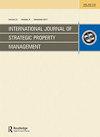通过联盟引导竞争:日本丰田汽车战略分析
IF 1.7
4区 管理学
Q3 MANAGEMENT
International Journal of Strategic Property Management
Pub Date : 2023-08-27
DOI:10.53819/81018102t4188
引用次数: 0
摘要
本研究旨在研究丰田的战略,形成联盟,以导航竞争在日本汽车工业。利用2000年至2020年的数据,该研究发现丰田参与了17个战略联盟,其中65%是与其他日本公司合作的。定量分析表明,在每个联盟成立后的三年内,丰田的平均收入增长了8.7%,市场份额增长了5.1%。回归模型证实,这些联盟对丰田的整体市场地位有统计学上显著的正影响(p < 0.05)。该研究采用了混合方法,将统计分析与三个关键联盟的深入案例研究相结合:与松下(Panasonic)合作开发电池技术,与铃木(Suzuki)合作开发紧凑型汽车,与软银(SoftBank)合作开发移动解决方案。对丰田高管的采访显示,这些联盟不仅是机会主义,而且是丰田长期竞争战略中根深蒂固的一部分。访谈的专题分析指出,这些联盟背后的主要动机是技术共享、市场渗透和风险分散等目标。研究结果对理解战略联盟在竞争战略中的作用具有重要意义,特别是在竞争激烈的成熟市场,如日本汽车行业。他们还通过证明这种联盟可以作为在充满挑战的环境中维持甚至增加市场份额的有力工具,为现有文献增添了新的内容。因此,该研究证实了丰田以联盟为基础的方法在保持其在日本汽车市场的领导地位方面的有效性。关键词:战略联盟,竞争战略,丰田,日本汽车工业,市场占有率本文章由计算机程序翻译,如有差异,请以英文原文为准。
Navigating Competition through Alliances: An Analysis of Toyota's Strategy in the Japanese Auto Industry
This study aimed at examining Toyota's strategy of forming alliances to navigate competition in the Japanese auto industry. Utilizing data from 2000 to 2020, the study found that Toyota engaged in 17 strategic alliances, of which 65% were with other Japanese companies. Quantitative analysis showed that these alliances led to an average revenue increase of 8.7% and a market share growth of 5.1% for Toyota within three years of each alliance's initiation. Regression models confirmed that these alliances had a statistically significant positive impact on Toyota's overall market position (p < 0.05). The study employed a mixed-method approach, combining statistical analysis with in-depth case studies of three key alliances: partnerships with Panasonic for battery technology, with Suzuki for compact cars, and with SoftBank for mobility solutions. Interviews with senior executives revealed that these alliances were not just opportunistic but were deeply ingrained in Toyota's long-term competitive strategy. Thematic analysis of the interviews pointed towards objectives such as technology sharing, market penetration, and risk diversification as the primary motivations behind these alliances. The findings have significant implications for understanding the role of strategic alliances in competitive strategy, particularly in highly competitive and mature markets like the Japanese auto industry. They also add to the existing literature by demonstrating that such alliances can serve as a powerful tool for sustaining and even increasing market share in a challenging environment. The study thereby confirms the effectiveness of Toyota's alliance-based approach in maintaining its leadership position in the Japanese automotive market. Keywords: Strategic Alliances, Competitive Strategy, Toyota, Japanese Auto Industry, Market Share
求助全文
通过发布文献求助,成功后即可免费获取论文全文。
去求助
来源期刊
CiteScore
4.00
自引率
18.50%
发文量
23
审稿时长
15 weeks
期刊介绍:
International Journal of Strategic Property Management is a peer-reviewed, interdisciplinary journal which publishes original research papers. The journal provides a forum for discussion and debate relating to all areas of strategic property management. Topics include, but are not limited to, the following: asset management, facilities management, property policy, budgeting and financial controls, enhancing residential property value, marketing and leasing, risk management, real estate valuation and investment, innovations in residential management, housing finance, sustainability and housing development, applications, etc.

 求助内容:
求助内容: 应助结果提醒方式:
应助结果提醒方式:


